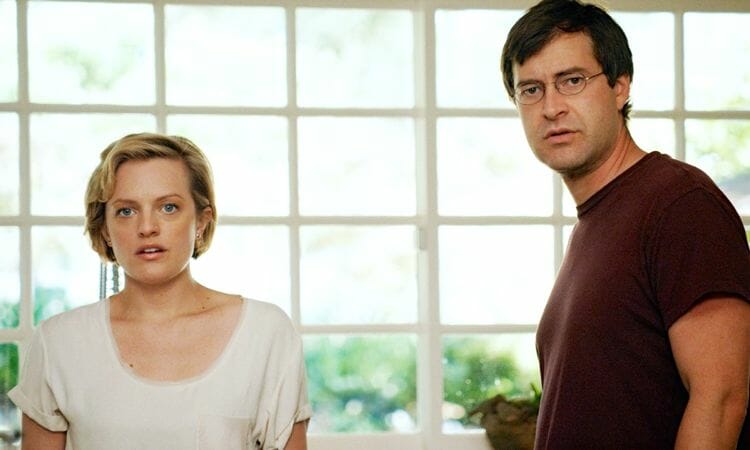By Jim Rohner · August 24, 2014


Ethan (Mark Duplass) and Sophie's (Elisabeth Moss) marriage is struggling.
Our first introduction to the couple on the rocks is through Ethan's voiceover of the night they first met, a romantic evening that ended excitingly and spontaneously with a dip into a stranger's pool. The reverence heard in Ethan's tone as he recalls the tale is painfully dissonant with the anniversary re-attempt – an otherwise uninspired mundanity over which the voiceover plays.
Their therapy sessions are marked with eyes that infrequently meet unless it's to argue against passive aggressive assertions and proposed exercises of simultaneity that reaffirm how far off the same page they are. Their Therapist (Ted Danson) suggests an escape, a weekend getaway from whence past couples have returned "renewed." They both eventually agree. "I'll try anything," Ethan remarks, not dishonestly.
The getaway, unnamed in both title and location, is isolated and picturesque. The property, apparently a little off the beaten path, is a small-scale Eden complete with fruit trees, lush greenery, and swimming pool. The interiors of both the main and guest houses are modest and chic with the adorable, decorative bookshelves and loft bedroom that you've unquestionably stumbled across on Pinterest.
Here, Ethan and Sophie get back on track to happiness. They smoke pot together in the kitchen of the main house. They look each other in the eyes when they say "I love you." They have sex for the first time in a long time in the guest house. Seemingly taken in by the charm of the dwelling that got their relationship back on track, Sophie suggests to Ethan that they spend the night there. He agrees. She heads back to the main house to retrieve her PJs and finds Ethan sleeping on the couch despite just leaving him. He also has no memory of the sex they previously had. They fight.
The following morning, Ethan awakes on the couch in the guest bedroom to an apparently forgiving Sophie making him breakfast. "That was one of the crazier fights we've ever had," he claims. She agrees with a smile, but she offers no insight as to its cause other than, "it was just one of those things." Why is she so willing to let it go when she wasn't last night? And why is she cooking bacon? She hates bacon…
Strange things are afoot in The One I Love, a romantic comedy that, in the refreshing vein of recent indie rom-coms, doesn't overemphasize either the romance or the comedy, but instead admirably balances the two so that neither are offset and the relatability of the couple and the struggle of repairing their marriage comes across much clearer and without either needless cynicism or romanticism. The plight of Ethan and Sophie isn't exaggerated; it's not the kind of relationship that's experienced the highs and lows of movie screens. Ethan and Sophie have not been through something unheard of in human history and they are not striving for anything more than anyone in their situation would. They are ordinary.
It's important that Ethan and Sophie come across as Everyman and Everywoman because The One I Love, like Safety Not Guaranteed and Another Earth before it, uses the collision of the ordinary into the extraordinary to put a sharper focus on regular struggles by approaching them through a new lens. There's a reason why Sophie makes bacon in the morning and a reason why Ethan can't remember the sex they had and while it's not for me to disclose the "how" (nor could I sufficiently do so even if I tried), the "how" is also unimportant. What's important is what doors the extraordinary opens for our ordinary couple, how when confronted with alternatives, the response, depending on the person, can either bring into focus that which was hazy, or obfuscate that which was taken as a given.
The One I Love is most effective when it takes time to ruminate on the emotional repercussions of the things Ethan and Sophie encounter, breezing through the first two acts as the perpetuance of the extraordinary events unfolds. An effective character study, the film slows down a bit in its final act once the narrative slows down to explore more of the conventions of the genre rather than its fallout.
The fact that the film is so effective in its explorations as a comedy is not only a testament to the script from Justin Lader, but also to genre filmmaking in general as just a few directorial tweaks here and there could effectively mutate this comedy into a psychological horror film or an introspective drama (Charlie McDowell's own Solaris). Some tweaks could've perhaps behooved the film since the comedy, while inherent in some scenes and unexpected in others, feels forced at times, almost as though galloping brass instruments were added to the score because silence would've otherwise been too heavy. Tonal indecision is also the culprit I'm naming in the assassination of an effective ending, giving us one that raises questions as to the entire journey previously experienced, which would be fine if The One I Love was a more straightforward genre servant, but see as it's not, it's hard to see the conclusion as anything other than an unwelcome injection of cynicism into an otherwise earnest film.